The rise of legacy and campaign board games, and what it means for the hobby
Despite the lack of headlines in the media, an uncommon event occurred just before New Year’s Eve — revealing a few things about what’s happening in the board games space right now.
On December 29th, Isaac Childres’ Gloomhaven became boardgamegeek.com (BGG) top-rated title, stealing the number #1 position from Pandemic Legacy, another campaign-based game that had been dominating the rankings for the past two years. It wasn’t a surprise, as the second print of this crowdfunded behemoth was delivered in October, and spectacular praises had steadily kept pouring in since then.
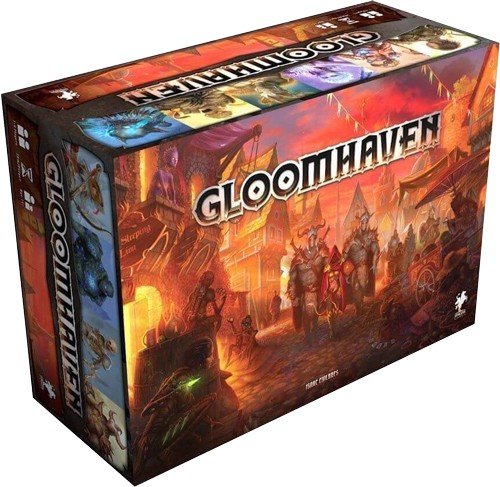
The massive box weights almost 9 kg / 20 lbs!
Those reviews tell all you need to know about the game itself, so we don’t need to linger there too long. Suffice to say Gloomhaven is a brilliant mix of various influences. Its recent consecration underlines a current trend in board game designs: campaign-based games seem to be gaining momentum, despite the fact that in the 80k+ titles database of BGG, only 100 of them belong to the category. What’s more, ten make the top 100 list, including number #1 and #2.
The same goes for Legacy games — only six of them have been published, but it seems they’re on everyone’s lips these days! Are Legacy games the next natural step for board games, and in which ways are they influencing other genres?
The pioneers
To understand the origins of this trend, we took a look at the figures. There were virtually no campaign-based board games before Descent’s The Road to Legend expansion (2008), with some noticeable exceptions: its ancestor Doom (2004), and 1980’s bestsellers Heroquest and Space Crusade — primarily inspired by miniature and role-playing games. Almost forty campaign-based games have been released in the past two years alone, twice as many as in the previous ten years!
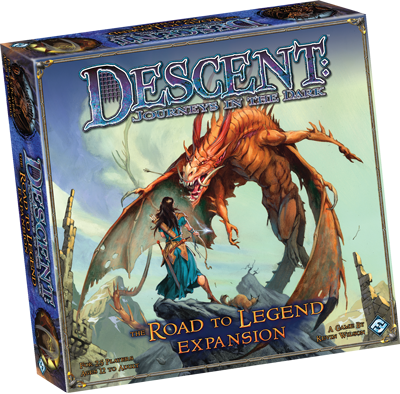
The Road to Legend expansion offers a new, rich campaign mode to Descent: A Journey in the Dark.
Campaigns have always been a common aspect of role-playing games (RPGs), either in their traditional tabletop incarnation or even in their video game counterparts.
Ironically, they may have been one of the reasons why many turned from RPGs to board games, when they realized they did not have as much time to play as in their youth. Board games offer a more flexible way of playing and bring a sense of closure after each session. Just like with movies, the right board game usually provides a great way to escape your daily grind for precisely the amount of time you can afford to invest in it. After a game, you just close the box shut and move on… an advantage that most RPGs don’t share.
But in the same way TV series changed the way we watch stories on the screen, campaign-based games are providing designers with new tools to create immersive game experiences with complex story arcs and surprising plot twists. Just like your favorite show, you can even “binge-play” Pandemic Legacy Season 1 — the name’s not an accident — going through the whole campaign over a single weekend.
Recent developments
Campaigns fulfill our increasing lust for adventures. American-style games were naturally the first ones to go down this path, as “themes” have always been stronger for that school of design compared to the European one.
Ten years ago, Fantasy Flight Games — already the leading publisher on the Ameritrash market — stepped into the campaign space with now well-established titles like Descent, Mansions of Madness and, more recently, Star Wars: Imperial Assault. Since then they designed dozens of expansions for each, and even apps to take the campaign mode to a new, fully cooperative level! Creating balanced campaigns is often a long and intricate process, but doing it right leads to great rewards as board games like Mice and Mystics, Zombicide or Shadows of Brimstone or card games such as Pathfinder Adventure Card Game or Arkham Horror: The Card Game can testify.
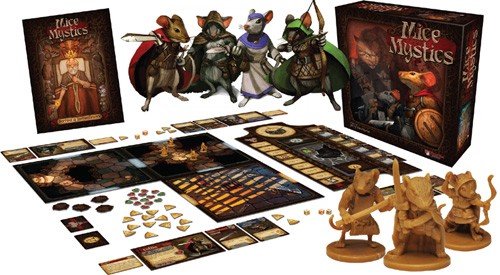
Mice and Mystics offers a 11-chapter adventure.
In 2012, Menzel’s Legends of Andor became a hit on this side of the Atlantic: as the first Eurogame with a real campaign, it did not focus too much on the story itself, but rather on the game system’s ability to evolve throughout one or more games. It made it easier to learn the rules bit by bit, with more straightforward rules at the beginning, and progressively more complex ones introduced later on, reflecting the campaign events. For the first time, the rules of the game determined the pace at which the story unfolded.
Legacy games
The real disruptive idea surfaced a couple of years earlier when Rob Daviau made a joke about how people in Clue should stop inviting Colonel Mustard to their dinner, as he was always the murderer. Something clicked in his head: what if games could remember what happens from a session to the next, instead of rebooting from scratch? This witty observation eventually led to the Legacy system, first implemented in 2011 with Risk Legacy.
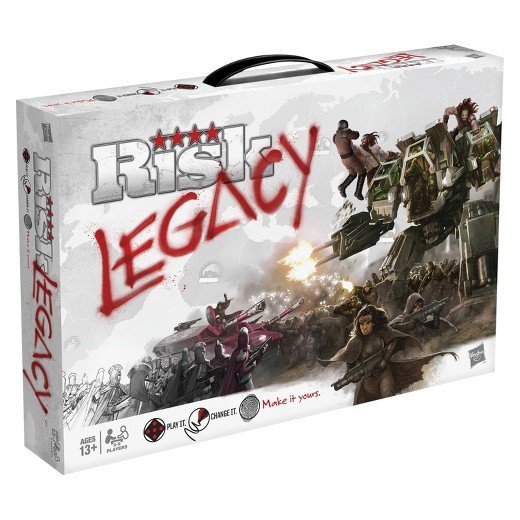
Risk Legacy left a lasting mark on the board games community.
Unlocking new content and discovering new rules as the events unfolded took the surprise and excitement of playing to a whole new level. Making your campaign a unique, custom experience, permanently altered by your group’s choices, was engaging players in a novel way. When you’re asked to tear up a card or use a permanent marker on the board, each decision has lasting consequences. Picking a bonus to win this game right away, or favor the long-term strategy and win the campaign? These were the new kind of choices players were faced with now.
Maybe because players were — understandably — still reluctant to buy a $65 game just to tear it to pieces, Risk Legacy failed to be a best-seller. It was, however, a breath of fresh air for the industry as it paved the way for Pandemic Legacy, which would steal the show four years later. This success lifted most of the distrust players had for Legacy games and put on display their real potential. Legacy games, however, will never conquer game stores by the hundreds. Designing such intricate games is not a walk in the park, and playing through them may be a little too demanding for anyone else than enthusiastic players with regular gaming groups. Still, they are here to stay: while Pandemic Legacy Season 2 hit stores and sales charts, the first opus still holds good positions in both.
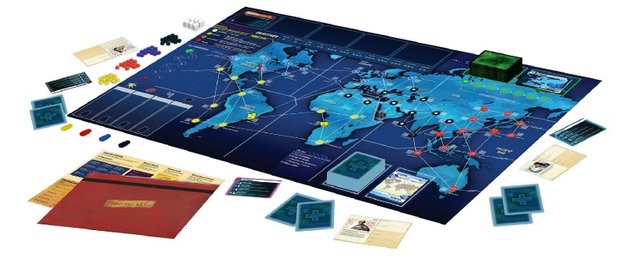
In Pandemic: Legacy Season 1, players will hopefully save the world—but they won’t spare the board and cards…
And, of course, there are so many other types of game to explore: Rob Daviau brought Legacy to 4x games with Seafall, Isaac Childres to Dungeon-crawlers with Gloomhaven, and now Jamey Stegmaier to Euro-style worker placements with Charterstone. Bézier Games will even release, later in 2018, Ultimate Werewolf Legacy, bringing one of the most famous social and bluffing game in the Legacy-era.
Other games could get the Legacy treatment through add-ons: Scythe’s third — and allegedly last — expansion, titled The Rise of Fenris, will provide a campaign, with new components to unlock as you progress with the plot. However, publisher Stonemaier Games already announced that The Rise of Fenris will have no permanent effect on the base game and that it will be possible to play the campaign multiple times.
“Fabled games”
Indeed, the necessary alteration to the components (writing on the board, scratching out hidden texts, or tearing up cards) and the impossibility to play the campaign more than once is one the most significant obstacles when it comes to buying a Legacy game.
Inevitably, someone came up with a hybrid product that keeps the progression aspect, without the need for permanent modifications to the components.
German designer Friedemann Friese, for example, released Fabled Fruit and the Fast Forward series (aka “Fabled games”): the decks are designed to teach the rules (sometimes from scratch) and they modify the gameplay over time. Some cards reveal new rules, others new game options. Cards are easy to reset — just sort out the cards to restore the initial order, and start over.
2F-Spiele already released 3 titles in their new Fast Forward series.
Harry Potter: Hogwarts Battles is also pretty close to this philosophy, with all the components inside the box being contained within seven smaller boxes (one for each book of the series), to be opened in succession as you win the previous game.
It’s also funny to notice that other games, like Shadowrun Crossfire or Dragonfire, belong to the opposite side of the spectrum, with permanent alterations (mostly stickers on character sheets), but lighter storylines and very few rules outside what’s in the rulebook.
While Legacy games are a pleasing proof that board game designers are not running out of ideas any time soon, all campaign-based games have something in common: the pleasure to meet regularly with the same group of players, and experience something together bigger than a single game-night.
Dragonfire is the new version of Shadowrun: Crossfire, set in the world of D&D.
And Dized?
We are currently considering how Dized could support these experiences for different games. Of course, an app could never recreate the feeling of tearing up a card, but it could offer a greater immersion, additional campaign modes based on long narratives, where your decisions would matter from a game to the next and an easy way to track both progress and the overall status of the game.
We can’t wait to hear your ideas and dream features, so head to the Dized Fellowship on Facebook and let us know!
— -
Want to learn more about Dized? Sign up on this page and make sure you’re the first to discover what’s new — we’re working on a few exciting things! No spam, only good stuff. You can also follow us on Facebook, Twitter and Instagram.
I gave you a top vote even though I understood very little, as I can see the quality of your writing.
My questions: I am about to retire. I will have plenty of time on my hands. So tell me:
What’s the best most luxurious indulgence of a game?
Is it physical, with a board and pieces, or virtual online.
Who do I play it with? How many people?
What does “campaign based” mean?
Can i have a good game in less than an hour?
Hi @swissclive, thank you very much to like and vote my work.
This game is not an online game, it is a game with physical pieces which is good for having great time with your friends. Glomhaven is a strategy game.
You are my first friend who has top vote, please follow me and vote my work, so that I like Steem more. Thank you
@originalworks @tippy
The @OriginalWorks bot has determined this post by @zkan to be original material and upvoted it!
To call @OriginalWorks, simply reply to any post with @originalworks or !originalworks in your message!
Bu güzel yazınıza TR Tagına destek amaçlı oy verilmiştir :) . Steemit Yardım forumu // www.coinskop.com //
Hi. I am @greetbot - a bot that uses AI to look for newbies who write good content!
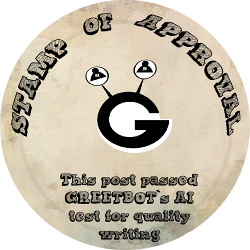
Your post was approved by me. As reward it will be resteemed by a resteeming service.
Resteemed by @resteembot! Good Luck!
The resteem was paid by @greetbot
Curious?
The @resteembot's introduction post
Get more from @resteembot with the #resteembotsentme initiative
Check out the great posts I already resteemed.
Nice write-up. I'm waiting for my Gloomhaven to arrive. I'll probably have to take a day off work to play it.